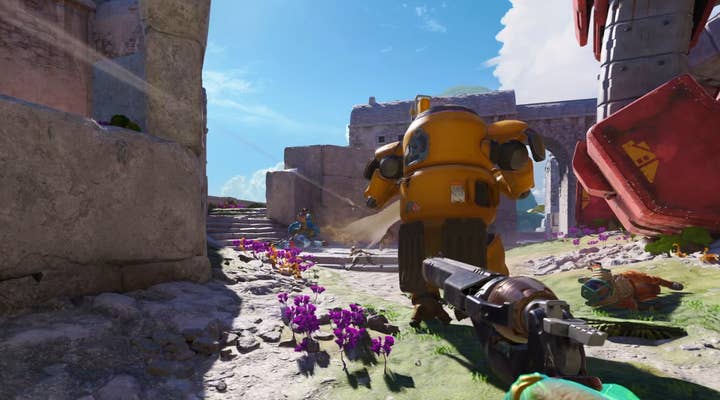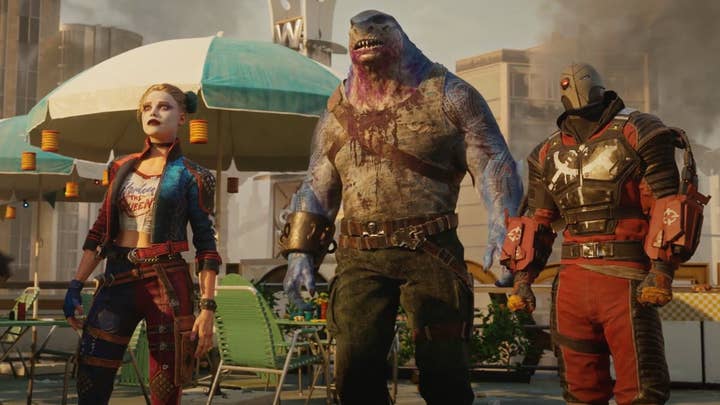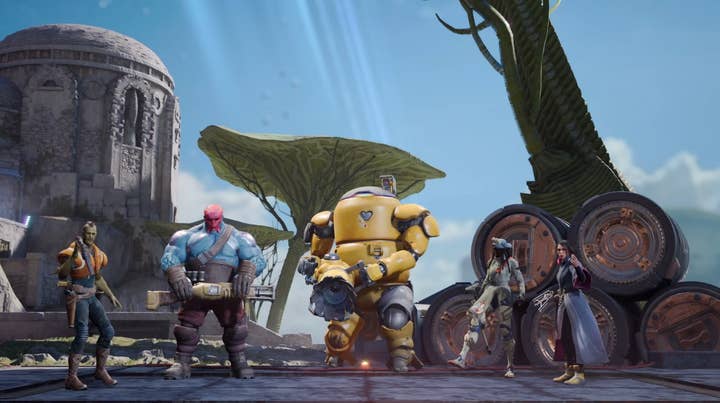Sony avoids F2P as its live service model takes shape | Opinion
Concord following Helldivers 2's pricing suggests a non-F2P strategy – which creates difficult challenges, but could lead to a more sustainable business in the end
Sony's decision to devote around a third of the entire runtime of its State of Play event last week to upcoming hero shooter Concord was a fairly clear statement of intent – the company's desire to pivot towards live service games burns unabated, and while the high-quality singleplayer games upon which PlayStation's studios' reputation was built aren't going anywhere for now, they will at least have to share the spotlight with their upstart live service brethren from now on.
Beyond that headline grabbing strategy, though, Sony has also made one further statement of intent with regard to Concord, although this one, for some reason, was made about as quietly as the firm could manage. Concord isn't going to be a free-to-play game; following in the footsteps of Sony's earlier live service success, Helldivers 2, it's going to launch at a $40 price point.
Two games does not a strategy make, I suppose, but the fact that Sony has chosen to use this pricing for both a co-operative PvE game like Helldivers 2 and now a PvP hero shooter like Concord strongly suggests that this is a model the firm is at least somewhat committed to.
It's certainly not shouting about any such commitment from the rooftops, though. Concord's pricing details were released on its PlayStation Store listings without fanfare or announcement, which actually feels like something of a missed opportunity, since the corollary information that the game's future maps, characters, and story vignettes will all be available for free would probably have gone down very well with the State of Play audience, and might even have shifted the conversation about the game a little more positive.
If this is indeed Sony's emerging 'house style' for live service games, then it's a very interesting one. I'm sure there will be some latitude within the model for games that are more obviously suited to a different monetisation strategy – perhaps Sony will even fully embrace F2P for some titles – but thus far the shape of what Sony is doing with these games involves an up-front payment, albeit a competitively priced one.
Sony is making things a bit harder for itself by avoiding free-to-play – but its calculation that this approach will lead to a more sustainable live service business in the medium to long-term may be well founded
That runs counter to the prevailing industry logic about live service games, which generally holds that the F2P approach of making the game client itself free to download is required to remove barriers to entry and get the maximum possible number of players into the game, where they can eventually be converted into paying customers. Sony isn't taking that approach, and that's a decision which has far-reaching consequences for the types of live service games it will ultimately launch.
Of course, Sony has one powerful data point on its side in this regard: Helldivers 2, which launched with precisely this model and has become the fastest-selling PlayStation game to date, and the breakout hit of the first half of this year. That's a pretty good counterpoint to anyone raising their eyebrows and pointing at disasters like Warner Bros.' Suicide Squad: Kill The Justice League, a live service title which launched at full price and which, according to Bloomberg, has performed so badly that its publisher has taken an eye-watering $200 million loss on the game.
Of course, Suicide Squad had deep, deep problems that went far beyond its business model, but the roll-call of premium-priced live service titles that have flopped hard is difficult to ignore; from the likes of Anthem and Marvel's Avengers, via more recent failures like Skull & Bones, to even some attempts at exploring lower price points like Foamstars, the list of failed live service games whose model included an up-front payment is a sobering one.
Not that there haven't been F2P failures, of course; but a model that forces a live service game to convince players to pay for it before they start playing is undoubtedly setting the difficulty on hard for itself. Nonetheless, it's undeniable that Helldivers 2 has managed it thus far.
It's worth setting out clearly what the advantages of F2P for a live service game actually are, because – as many, many companies that have tried to transition premium games to F2P models after the fact have discovered – the basic decision of whether to charge up-front for the game or not has knock-on effects across a huge swathe of the design of the game and its systems.

Removing this financial barrier to entry doesn't just encourage a much wider group of players to try out the game, it also generally improves the experience for paying players by creating a large base of 'free' players who make the game feel much more active and dynamic. Removing the up-front cost barrier helps to avoid speed bumps and plateaus in the growth of the game – points where despite the game having a generally good reception, growth flattens and player numbers fall off because the highly engaged audience is saturated, and the 'next tier down,' casually curious audience is much more sensitive to up-front costs.
The F2P model is also great for encouraging cross-platform play, since players can easily download the client to any of their devices and log into their account to access their paid-for content and upgrades.
All of this is exacerbated greatly by the fact that most of the competition a live service title will face is already F2P – so in essence, you're asking people to pay money for a product your most established competitors offer for 'free.'
This is the factor which ultimately led Blizzard to rework its hero shooter Overwatch, which seems to be the most analogous title on the market to Concord, into an F2P business model – it simply didn't seem like Overwatch could compete with the F2P behemoths in that field while being held back by its own price tag.
Yet the F2P-reworked Overwatch 2 is also a tough lesson in how deeply the difference between a paid-for game and a free client impacts player psychology in their engagement with game systems; the original audience for Overwatch, who paid for the game up-front, reacted incredibly negatively to the more aggressive monetisation strategies of the now-F2P Overwatch 2, forcing Blizzard to roll back several of its more egregious changes to the game.
The decision of whether or not to charge up-front for the game has knock-on effects across the design of the game
Sony will have to tiptoe carefully around post-launch monetisation of its own live service games for this reason; players who have paid for a game up front have a very different tolerance level for monetisation strategies to those who have downloaded a free client.
So why, given all of this, is Sony not embracing a pure F2P approach with its games? It's tempting to suggest that Sony's focus on the paid-for model is simply down to being a company deeply embedded in traditional game software business models, and wary or nervous of committing itself fully to F2P. That's certainly behaviour we've seen in the past from publishers that just can't bring themselves to 'give away' a game that's taken them tens of millions of dollars to develop, or can't make themselves comfortable with counter-intuitive aspects of the F2P model such as having such a large group of players who don't pay any money at all.
However, I don't think that analysis fits with what we're seeing from Sony. The company may be pretty new to F2P overall, but this is a platform holder that's watching the Hoyoverse cash roll in on PlayStation; it sees and understands how F2P works and what it requires, and has nonetheless made a choice to eschew that approach.
I can see three major reasons why Sony may have decided to avoid F2P and instead push forward with an upfront payment model for its live service games. Firstly, this approach reduces player churn and gives the developers more breathing room in the early stages of the game's operation. Many F2P games are flash in the pan; there is a large group of consumers who try out each new game as it appears but move on rapidly, churning over to the next big release without ever becoming paying customers.
Adding a payment barrier means missing out on those players – who arguably aren't very important to the business anyway – but ensures that the players you do have are quite literally invested in the success of the game, and are encouraged to hang around for long enough to get their money's worth, at least. This is a trade-off; you slow your player acquisition, but those players you do acquire are more likely to stick with the game and give it a fair shot, rather than bouncing at the first sign of friction.
Sony seems to feel that while full-price is too high a barrier, the $40 price point is a sweet spot for this trade-off. Long-term, though, it will still run into issues with trying to engage more casually interested audiences – there's some evidence to suggest that Helldivers 2 has hit a speed bump of this sort in recent weeks, for example.

Secondly, creating a cost barrier to entry can also have very positive effects for the community which forms around the game, because it inherently means that efforts to reduce abusive behaviour in the game actually have teeth. Getting banned or suspended from an F2P game generally just means creating a new free email address so you can sign up again; getting banned from a paid-for game can mean having to buy a whole new copy of the game.
This is notably a bigger concern for Sony than for most live service game operators because Sony is also a platform holder; it's conscious of being seen as responsible for player behaviour on its platform and of the importance of protecting the PlayStation image and brand. I don't think this aspect would be enough to prevent Sony from embracing F2P if it really thought that was the best way forward for its games (and notably, it also has enforcement avenues via the PS Plus subscription service), but it's undoubtedly aware of it as a side benefit of its approach.
Finally, and perhaps most notably, there's the PS Plus aspect to this. Sony has an option in its arsenal that is very unusual among live service game operators; it doesn't ever have to overhaul the business model of its live service games to make them F2P (like Overwatch did), because it already has a hugely popular mechanism for making games free for a certain period of time to people who pay a monthly subscription to PlayStation.
Sony has been watching the Hoyoverse cash roll in on PlayStation; it sees and understands how F2P works and what it requires, and has nonetheless made a choice to eschew that approach
This could allow it to overcome plateaus in its games' growth curves, giving an injection of new players at some point down the road from launch, without the stigma of being seen to make the game F2P – a move generally associated with failure in players' minds. Of course, this only works on the PS5 platform, not on PC, so some other strategy may be needed for PC launches, but at least on the console side of things, PS Plus' game catalogue is a powerful weapon for the live service strategy to have in reserve.
Ultimately, Sony is undoubtedly making things a bit harder for itself by avoiding going F2P up front with these titles – but the company's calculation that this approach will lead to a more sustainable live service business in the medium- to long-term may be well founded.
The broader questions of how deep consumers' tolerance for an endless flood of live service games is, and how many of these games can be supported concurrently by the existing market, remain extremely challenging to answer – but in the choice of business model, at least, there may indeed be method to Sony's madness.


